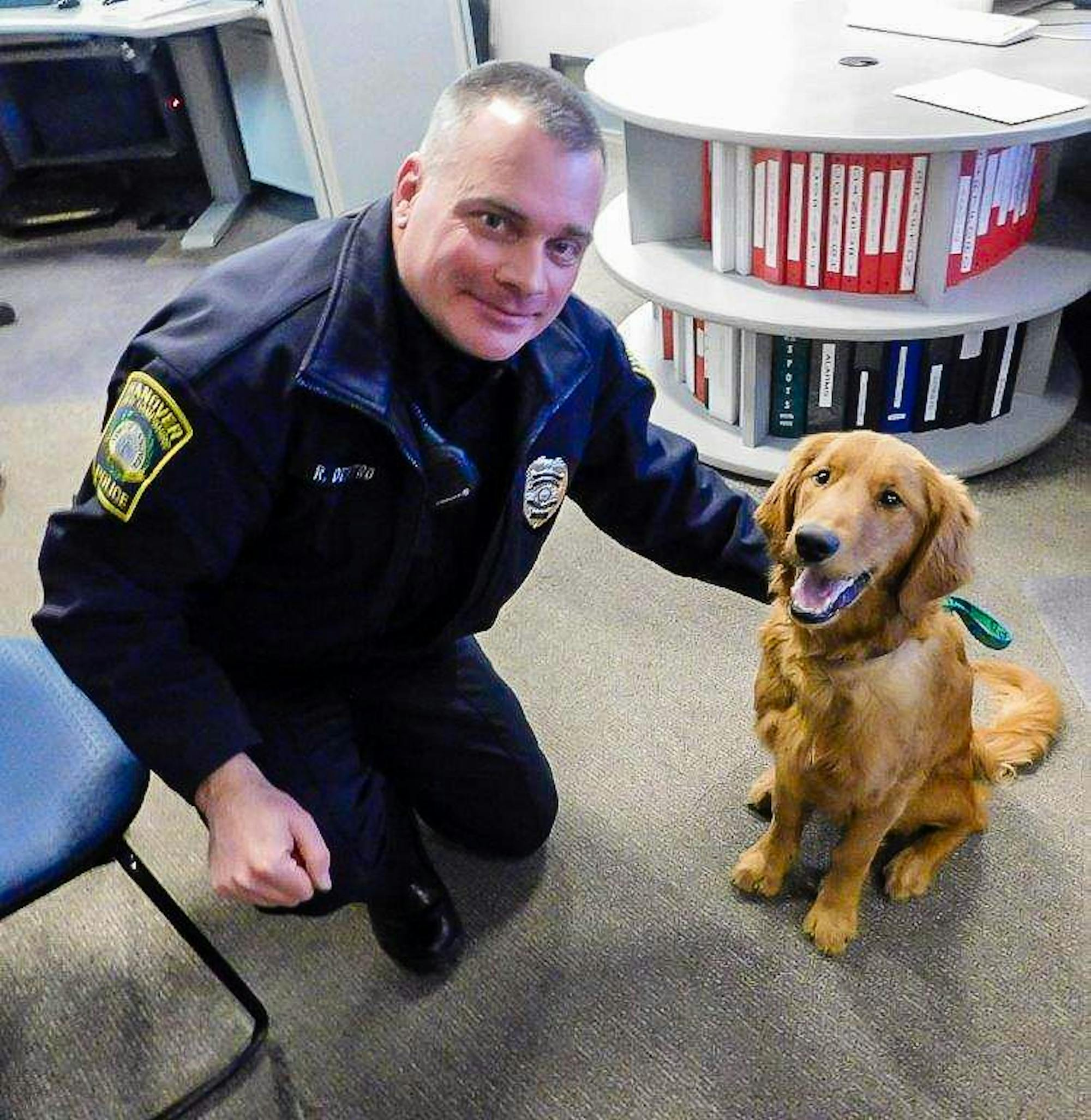While students stayed in the library or in their rooms at the end of last term, studying for final exams and waiting out the seemingly endless torrent of nor’easters, research grant manager Jean Blandin’s red-golden retriever puppy Hocus was missing, likely without food or shelter.
Luckily, Hocus has since been found and is now safe and healthy, according to Hanover Police patrol officer Robert DePietro, who helped guide the dog home.
Hocus was missing for about three weeks before a concerned citizen found him in her yard on Occom Ridge and contacted the Hanover Police department, where DePietro responded to the call, he said.
DePietro added that Hocus was away from home during two nor’easter storms, likely living outside.
Hocus first went missing on Feb. 23 when a truck startled him during a walk, Blandin said.
“I had stopped and let [the truck] go by, and it stopped and just stayed running,” Blandin said. “I had a retractable leash and it was hooked to [Hocus’s] back, so he had all the power, and he yanked me off my feet and went between two cars. By the time I got up, he had already disappeared between Richardson and Wilder Lab.”
Blandin said she immediately went to get help from Tressy Manning, an administrative assistant in the physics and astronomy departments.
“I went all the way down frat[ernity] row asking people, and no one had seen him,” Blandin said. “[My husband and I] came back up Friday night and looked again after work.”
She said she returned to the area nearly every day to search for Hocus, asking people about any potential sightings.
Blandin made a poster describing the dog and asking people to contact her with information. She sent it to her department head, who sent it to other departments, after which the poster quickly spread around campus, Blandin said.
Blandin also left food in several places around the area where Hocus might have gone and left posters with restaurants on Main Street, hoping that the dog would wander into town when he got hungry. Several people emailed Blandin, telling her that they were distributing posters around to houses in the area, she said.
English and creative writing department administrator Bruch Lehmann was one of the many staff members who searched for the dog. She also shared the poster on Facebook and hung posters around Sanborn Library, she said.
“I sent [the poster] out to various lists of people,” she said. “I went looking for the dog, both at my lunch hour and on weekends.”
There were three sightings of Hocus after he went missing, Blandin said.
According to Blandin, a graduate student was the first person to see Hocus, spotting him on a path near frat row. However, Blandin said that the student did not approach the dog because she was afraid he would run from her.
Three weeks later, when a Hanover resident saw a skittish puppy circling her garage, she contacted law enforcement, according to DePietro.
DePietro said that the resident seemed like a “dog person,” but that she felt uncomfortable approaching Hocus because she thought the dog might have growled at her.
Hocus was skittish with DePietro as well, so he and the concerned citizen talked to each other near the police car in the hopes that their feigned disinterest would lure Hocus to them, DePietro said.
“We called out to him that he is a good puppy and a nice dog,” DePietro said.
Eventually, when DePietro was not looking at him, Hocus came near enough so that DePietro, with the help of the resident, was able to maneuver the dog into the police car.
The puppy could not be immediately identified, as neither the citizen nor DePietro knew that Blandin was searching for her missing dog. However, DePietro used the identifying tags on Hocus’s collar to contact the dog’s veterinarian, who remembered that he was missing. The veterinarian got Blandin’s poster from the clinic’s waiting room and put him in contact with Blandin, DePietro said.
He added that Hocus was in “good shape” when he was taken back to the station.
“As far as dogs go, he was very happy — was a little skittish at first, but he was becoming playful with us,” DePietro said. “He was really happy to see his owner. It was really easy to identify who he belonged to.”
Blandin said that she was thrilled to find out that Hocus was found.
“My first question was, ‘Is he all right?’” she said. “I said, ‘I will be there.’”
Blandin said that after she brought Hocus home from the police station, she found pine needles in his fecal matter.
“I really don’t think he was eating,” she said.
Though he lost 11 pounds over the three weeks he was missing, Hocus has gained back four pounds since then, according to Blandin.
“Hocus being found was thrilling news, and it still makes me smile to think about [it],” Lehmann said. “It gives me hope in the universe. One faculty member said that she was haunted by the fact that he was missing and was thinking about him all the time. Everybody was very concerned.”




